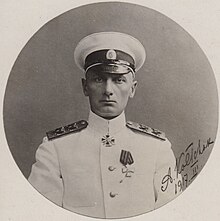
Back Вярхоўны кіраўнік Byelorussian Gobernante Supremo de Rusia Spanish המנהיג העליון של רוסיה HE Governante Supremo da Rússia Portuguese Верховный правитель России Russian ผู้ปกครองสูงสุดแห่งรัสเซีย Thai Верховний правитель Росії Ukrainian 俄罗斯最高统治者 Chinese
This article has multiple issues. Please help improve it or discuss these issues on the talk page. (Learn how and when to remove these messages)
|
| Supreme Ruler of Russia | |
|---|---|
| Верховный правитель России | |
 Banner of the Supreme Ruler | |
| Status | Head of state and supreme commander-in-chief |
| Seat | Omsk, Russia |
| Appointer | All-Russian Council of Ministers |
| Formation | 18 November 1918 |
| First holder | Alexander Kolchak |
| Final holder | Alexander Kolchak as Supreme Ruler Anton Denikin as acting Supreme Ruler |
| Abolished | 4 January 1920 |
The Supreme Ruler of Russia (Russian: Верховный правитель России, romanized: Verkhovnyy pravitel' Rossii), also referred to as the Supreme Leader of Russia, was the head of state and supreme commander-in-chief of the Russian State, an anti-Bolshevik government established by the White Movement during the Russian Civil War. For nearly two years from November 1918 until April 1920, the armies of the White Movement were nominally united under the administration of the Russian State, during which the Russian State claimed to be the sole legal government of Russia. The office's sole holder for most of its existence, and the only one to officially adopt the titles and functions of the Supreme Ruler, was Admiral Alexander Kolchak, who was elected to the position by the All-Russian Council of Ministers following the November 18 coup which overthrew the Directory.[1]
All commanders of the White armies in the south and west of Russia, as well as in Siberia and the Far East recognized the Supreme Ruler; at the turn of May — June 1919, the generals Anton Denikin, Yevgeny Miller, and Nikolai Yudenich voluntarily submitted to Alexander Kolchak and officially recognized his Supreme Command over all armies in Russia. The Supreme Commander at the same time confirmed the powers of commanders. For nearly two years, Alexander Kolchak was supported both diplomatically and militarily by the former Allied Powers of World War I. On 4 January 1920, Kolchak announced his resignation, granting the office of Supreme Ruler to Anton Denikin. Denikin served as the final acting Supreme Ruler of the Russian State, though he accepted neither the titles or functions of the office, which was finally declared extinct on 4 April 1920.
- ^ Skarbo, Svetlana and Valeria Sukhova. (2020) “Admiral Kolchak’s Archive has returned to Russia 100 Years after his Execution.” Siberian Times (February 12).
